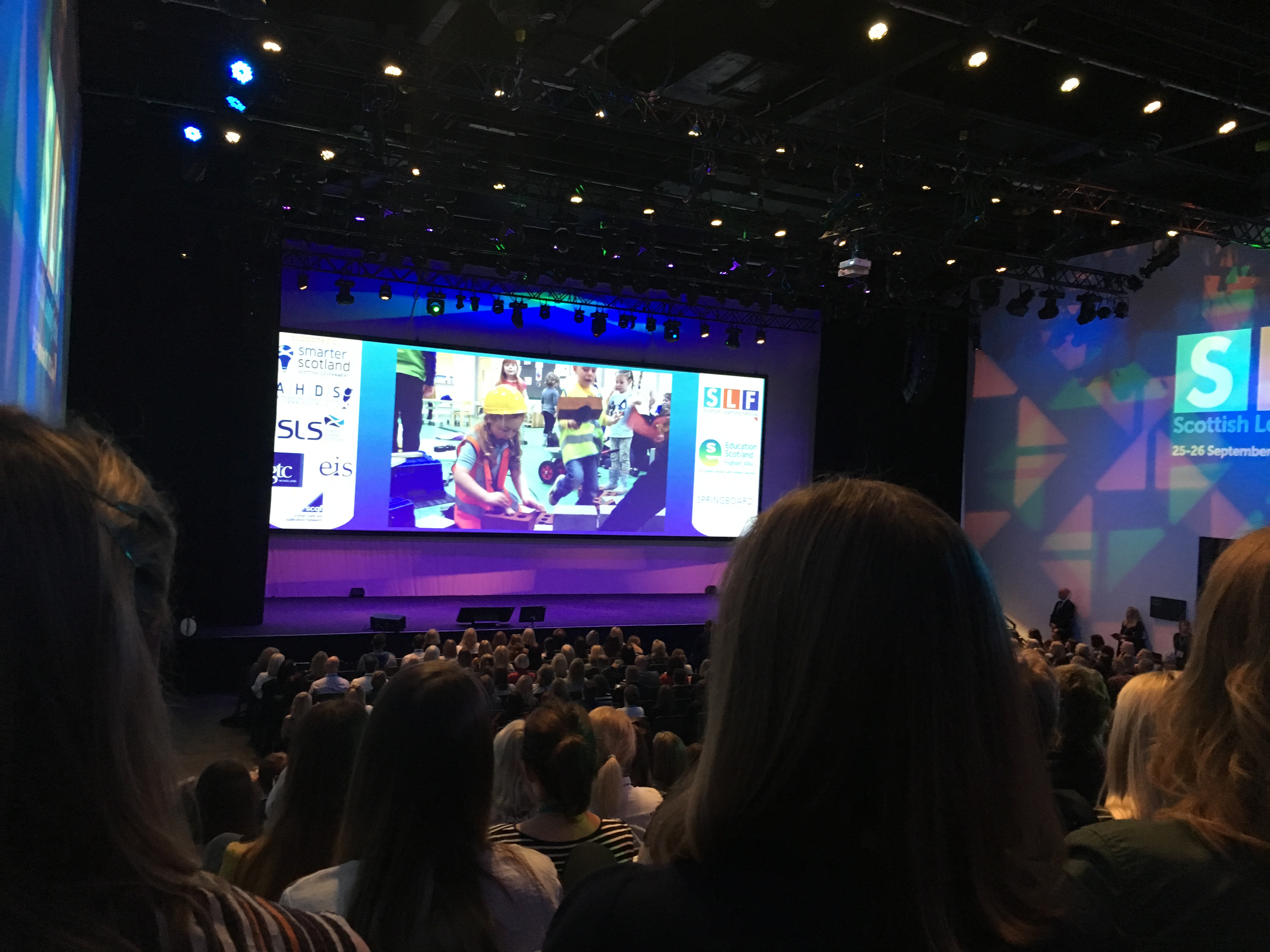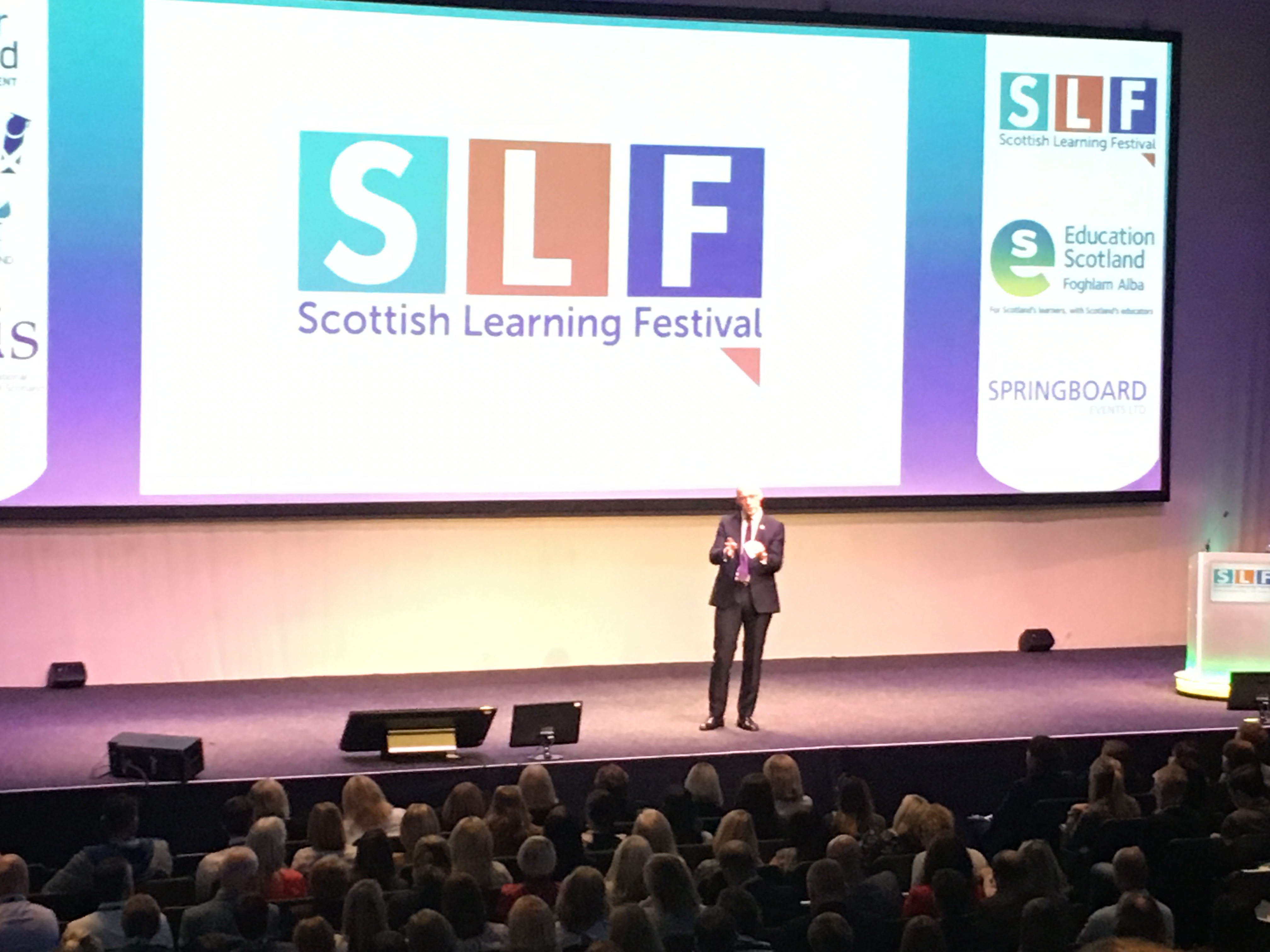by Rebecca Jackson
The Scottish Learning Festival (SLF) is the annual conference and exhibition for educational practitioners across Scotland. Across two days thousands of delegates and over 200 exhibitors from across the spectrum of Scottish education gathered at the SEC in Glasgow to take part in over 100 workshops and seminars reflecting the best of Scottish Education.
The conference theme this year was Achieving Excellence and Equity and across the two days delegates and speakers discussed a range of topics related to this, including the empowerment agenda for teachers and learners, how to drive improvement across all areas of education and the importance of wellbeing in developing a healthy and successful learning community, able to achieve the best possible outcomes.
Back to basics in Scottish Education
This year’s keynote address was delivered by the Deputy First Minister and Cabinet Secretary for Education and Skills, John Swinney MSP. In his speech Mr Swinney encouraged delegates to get back to basics on education, emphasising his belief in the importance of the core principles of Scottish Education and how increasing the focus on the “four capacities” can help learners achieve their potential. The four capacities allow learners to become: successful learners; confident individuals; responsible citizens and effective contributors.
Giving teachers autonomy to teach
He emphasised his belief that the autonomy of teachers should be key in the classroom and that teachers are best placed to make the key calls in relation to the learning of their students. Mr Swinney suggested that helping teachers feel like they can take responsibility for their own workload and to prioritise tasks that directly impact on learning over admin tasks was pivotal in ensuring that curriculum for excellence and the new qualifications recently introduced worked effectively for both teachers and young people. However it was clear from the reaction in the auditorium and in subsequent discussions, that there are some teachers who feel they are quite a way from being able to truly take control of their workload with many highlighting significant amounts of marking and administration and “teaching to test” which prevented them from teaching in the way they would like.
The Cabinet Secretary also faced a number of questions from the floor, including on the funding of special educational needs provision and the idea of mainstreaming (as opposed to funding specialist provision for SEN pupils), as well as questions on teacher workload, the value of National 4 qualifications and multi-level teaching, where national, intermediate and higher levels are all being taught in the same lessons. Mr Swinney said that multi-level teaching was working in some areas, and in some areas it helped to expand the range of subjects pupils are able to choose from, but he admitted that it may not work in all instances and that a review of the practice would be included in a more general review of senior education which has been ordered by the Scottish Government.
The gap that is proving difficult to close
The attainment gap was also high on the agenda, both in the keynote and in the breakout seminars. Closing the gap and raising attainment among children, young people and learners from disadvantaged backgrounds is something which is clearly a focus of people working across the education sector in Scotland, but the results and outcomes they are seeing look to be a mix of outstanding success stories and those young learners who are still falling through the net (who provision is not reaching and whose outcomes are not improving). Continuing the work of raising attainment through the Attainment Challenge (which has been granted funding beyond its current deadline to 2021) was highlighted, as was the effective and important work already being done in many schools to help and support those children from poorer backgrounds through their learner journey. The overriding message was to keep going because the gap is closing, even if it is not as quickly as we might like.
Everyone working together for common aims
The breakout seminars spanned topics across education, including early years, special needs education and the engagement of people from outside the school environment to create a holistic approach to the care and support of young people, including through youth work. The resounding tone of the discussions was that there is so much good work being done to support young learners in Scotland, that not only should we recognise it but we should try to share knowledge and learn lessons from it.
The conference ended with a call to action, encouraging practitioners from across the education sector in Scotland to come together, to work in partnership to improve outcomes for young people in Scotland and encourage practitioners and learners alike to strive to be the best they can be for the benefit of Scotland now and in the future.
If you enjoyed this article, keep an eye out for our second blog on the SLF, which reflects on one of the seminars attended by our Research Officer, Scott Faulds.
We have also blogged on a range of topics around education, including on Child and Adolescent Mental Health Services in schools. You can read more here.
Follow us on Twitter to see which subjects are interesting our research team.
Share
Related Posts
A recent item on BBC Radio 4’s Today programme generated an unusually high number of responses from listeners. A man who had lost his job in the financial services sector at the age of 57 described his difficulty in trying ....
By Donna Gardiner While free school meals (FSM) have been available in England on a means-tested basis since 1944, recent years have seen a renewed focus upon the potential benefits of providing free school meals to all school-aged children. Currently, ....
By Robert Kelk and Chris Drake A new start for an old challenge? The recent appointment of Marc Lemaître as the European Commission’s director general for research and innovation (R&I) has returned Europe’s R&I gap to the spotlight. Previously head ....
By Hannah Brunton UNESCO’s Global Media and Information Literacy Week 2022 takes place from 24-31 October 2022 under the theme of “Nurturing Trust”, giving governments, educators, information professionals, and media professionals the chance to discuss and reflect on critical issues ....


